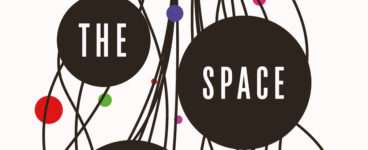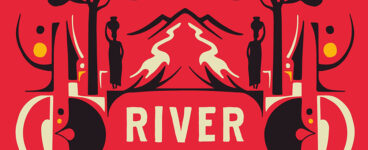‘As for the book itself, it important to emphasise that it is not memoir, not fact, it is fiction – literature, based on experience.’
Born in Minsk in 1981, international lawyer Maxim Znak was arrested in autumn 2020 and sentenced to ten years in prison in 2021. While imprisoned, Znak wrote 100 stories charting 100 days in prison in Belarus today, compiled as The Zekameron. The stories bear witness to resistance and self-assertion and the genuine warmth and appreciation of fellow prisoners. They were sent directly to Jim Dingley, who has worked with Scotland Street Press to bring them to an English audience. In this exclusive essay, Jean Findlay from Scotland Street Press explains why they published The Zekameron.
The Zekameron: One Hundred Tales From Behind Bars and Eyelashes
By Maxim Znak, translated by Jim and Ella Dingley
Published by Scotland Street Press
In early February 2022 I was talking to a friend, a poet, and telling him why we could not publish a manuscript that had come to us direct from a jail in Belarus. Two of our directors had advised against the risk of publishing such politically dangerous stuff. The poet said ‘Well, that is exactly why you must publish.’ Two weeks later the entire world turned against the official Russian and Belarusian state apparatus, so we wouldn’t stick out in our implicit criticism. It was safe to publish – for us, yes, but for the author would this just endanger his life further?
Arguments raged in the office, I maintained that this was a second ‘One Day in the Life of Ivan Denisovich’, (except that it is 100 days) and our designer said that she had heard that Methuen did not want to publish Solzhenitsyn in the West until he was safely out of Russia. But as is often the case in publishing, someone else did, it was published in New York and then the UK followed suit. Much later the Ukrainian writer, Vitaly Korotich, declared: “The Soviet Union was destroyed by information – and this wave started from Solzhenitsyn’s One Day“.
Maxim Znak is an international lawyer from Belarus – the country which borders Ukraine and which is run by dictator Alexander Lukashenka, one of President Vladimir Putin’s most loyal allies. After Lukashenka’s disputed re-election in August 2020, Znak was gathering evidence of violations of the electoral process when he was arrested and sent to Remand Prison no.1 in Minsk. He was held there from September 2020 until December 2021. This prison has the chilling reputation of being the only one in Europe where the death penalty is still being carried out. It was here that Znak wrote his stories.
These were sent directly to Jim Dingley who had previously translated two books (both Pen Award winners) from Belarus for Scotland Street Press. Both books were written in the Belarusian language, a language banned in Belarus. If caught reading, writing, speaking or singing in the language, people were liable to arrest, detention and punishment. The official language is Russian; it is the language of government, media and education. Znak has written his book in Russian.
The manuscript’s arrival provoked the question: would its publication endanger Znak’s life, or help agitate for his release? But as the brilliant lawyer had by then been sentenced to ten years in a penal colony in the North of Belarus, his wife and sister urged Scotland Street Press to proceed with publication.
As for the book itself, it important to emphasise that it is not memoir, not fact, it is fiction – literature, based on experience. Zek means prisoner in Russian and the title is also a wordplay on Boccaccio’s Decameron, which was a collection of 100 stories from different people escaping the Plague in 14th century Florence. However, Znak’s writing style is closer to Beckett than to Boccaccio. Banality and brutality vie with the human ability to overcome oppression. The tone is laconic, ironic, the humour dry. The stories bear witness to resistance and self-assertion and the genuine warmth and appreciation of fellow prisoners., Znak applies different writing styles in each of his stories and the translation aims to reflect that as closely as possible. The German translation, recently published by Suhrkamp in Berlin, translates it as one narrator in different states of being, more Kafkaesque. It has been well received.
Our first review on the Tweet sphere by Anna Vaught catches it well: ‘It’s a terse account of painful experience, prison, bewilderment; hugely atmospheric and extremely funny – full of dry wit and small biting observations. And what the book says about how we must write because speaking is too painful is so brilliantly drawn.’
As I write, I am told that Maxim has heard news of the publication and he has written.
‘About Scotland [Street] Press (previously I knew only about Scotland Yard) – I am really happy at the thought that the translation is successful. It’s great! Especially in English, the most widespread language of books. Wonderful. Thanks to those who made this miracle possible. I am very grateful. In his Legends of the Arbat Veller has a story about a poet from the mountains who became famous because a free translation was made of his poems by two Russian-speaking lads of Jewish nationality. I’ve forgotten who it was, perhaps Rasul Gamzatov … But the point is that the translations were better than the original – perhaps it’s like that here. That would be good. I’m keeping an eye on the fate of the publication, fingers crossed. Well, how can I keep my eye on anything? The view from my room is limited.’
Well thanks here are due to Creative Scotland and to Pen Translates for funding and to the hard-working team at Scotland Street Press. Above all thanks to the courageous writer, recognised by Amnesty as a prisoner of conscience.
The Zekameron by Maxim Znak, translated by Jim and Ella Dingley, is published by Scotland Street Press, priced at £12.99.
ALSO IN THIS ISSUE

 The Space Between Us
The Space Between Us
‘She saw clear skies, stars bulleting the blackness, the full moon. She thought about the distance t …














